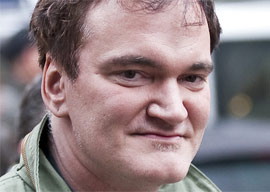
February 12, 2018

Quentin Tarantino
Source: Wikimedia Commons
When you watch a Martin Scorsese movie, you can tell he grew up in Little Italy around mobsters. When you watch a Quentin Tarantino movie, you can tell he grew up watching Martin Scorsese movies.
And that’s Tarantino’s main problem—he’s empty. Hopelessly postmodern. Incurably ironic. And entirely safe. He’s a slobbering, drooling, film-school nerd who stuffs his movies full of bloodshed and curse words, apparently hoping no one will notice the Uber-geek behind the camera who’s likely wearing either panties or diapers. He bears the unmistakably soft air of someone who’s never been punched in the face.
For all of his films’ alleged danger and violence, it’s always seemed barkingly obvious to me that he’s a twerpy fake who’d burst into tears if he chipped a fingernail. He’s an emblem of a generation which truly knows nothing beyond pop culture and gets nearly all of its “life experiences” from a screen.
I rented Reservoir Dogs on VHS back in the early 90s after feeling compelled to do so by the massive hype the low-budget film had generated. I fell asleep roughly a half-hour in. When I awoke, I didn’t bother to watch what I’d missed. Whatever aesthetic the movie was desperately trying to capture, I was sure that Frank and Dino had done it better in the early 60s.
Not having learned my lesson, I went to see Pulp Fiction in a Hollywood theater in 1994. It was a howlingly vacuous pomo mess of winking pop-culture references and staged violence that wouldn’t fool anyone who’s actually been in a violent situation. By the time they got to the scene at the diner with the Buddy Holly and Marilyn Monroe servers, I walked out of the theater. There was no substance here, only the half-digested waste material of someone who’d cannibalized countless other films but brought nothing new to any of them.
About ten years later, a girlfriend tried forcing me to watch the two Kill Bill movies, which repackage and regurgitate far superior Hong Kong action movies for four hours with the only apparent message being “girls, like, totally kick ass.”
Kill Bill? No, Bill’s not the one I wish had been killed. Tarantino’s films are basically The Simpsons with bloodshed and the word “nigger” tacked on to make them appear edgy. They are Fifty Shades of Grey for fat nerds who grew up watching Star Wars and wouldn’t know the difference between a plastic lightsaber and an AK-47. His movies couldn’t possibly be more devoid of substance. If you prick them with a needle, the only thing that leaks out is air.
Around the year 2000, I happened to catch Tarantino on Jay Leno’s show. What a meeting of the chins that was! At one point Leno announced that he had a surprise prepared for Li’l Quentin, and out from the wings marched Florence Henderson with a mint-condition version of a Brady Bunch board game she handed to the impossibly nerdy and twitchy Tarantino. It was then that I realized that not only wasn’t he someone who could endure one of his movies’ endless gun battles, he’d probably die of a heart attack if a car in his neighborhood backfired.
A couple years later I met comedienne Margaret Cho, who had dated Tarantino back in the early 90s when I was producing a violent magazine that had gained some notoriety due to the fact that my first wife and I posed with guns and cultivated an image as a Starkweather and Fugate duo ready to go postal at any moment. Cho told me she’d given Tarantino an anthology of my magazine and that he’d used me and my first wife as the character templates for his screenplay to the film Natural Born Killers, which was another ultra-violent film that seemed to have zero visceral understanding of violence.
Whereas I struggled to understand violence because I’d been exposed to it since infancy and because my deaf brother had been brutally murdered, Tarantino seemed to fetishize violence because he’d watched a lot of violent movies and thought it was awesome.
Tarantino went on to do a fake blaxploitation film called Jackie Brown. Like most Goodwhites—maybe a better term is Weak Whites—Tarantino worships blackness and even tries to talk black. He once said that abolitionist John Brown was his favorite American because Brown saw the righteous necessity of “spilling white blood.”
More white blood was spilled in Inglourious Basterds (2009) and Django Unchained (2012), Tarantino’s two most commercially successful films. What were the edgy and subversive ideas these films foisted upon the world? Why, the dangerous and radical notion that both Nazis and slavery were, like, totally uncool, man.
Is there any risk this man won’t take? Imagine walking into a Hollywood meeting and having the chutzpah to say, “Gents, I know this isn’t going to go over well, but I’d like to do a film that proposes the radical idea that Nazis were the bad guys.” Imagine being so cluelessly disconnected from reality that you think you’re making a dangerous statement by doing a “revenge” film against the side that LOST a war….and then following it up with a movie that drives home the point that slavery was a cruel and brutal institution.
Tarantino is such a trend-setter and rule-breaker that the main villains in his films tend to be deranged rednecks, which is remarkable when one considers that deranged rednecks have been the main villains in Hollywood films since the mid-1960s.